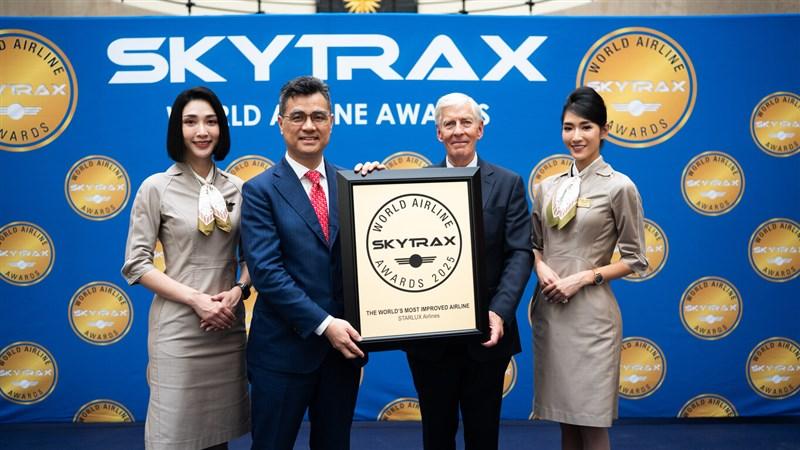Starlux Airlines Co (星宇航空) has been certified as a five-star airline and named the World's Most Improved Airline by Skytrax, a UK-based airline ratings agency, five years after it launched operations.
The five-star rating, announced at the World Airline Awards in Paris on Tuesday, acknowledges Starlux's outstanding passenger experience, cabin quality and onboard service, the airline said in a statement.
The World's Most Improved Airline award is given to the carrier demonstrating the greatest progress in all performance categories, Skytrax said.

Photo courtesy of Starlux Airlines via CNA
"It shows what we've achieved in just five years with the dedication of our team and the trust of our passengers," said Starlux chief executive officer Glenn Chai (翟健華), who accepted the awards in Paris.
Skytrax chief executive officer Edward Plaisted said that the five-star rating reflects Starlux's "focus on delivering a high-quality passenger experience," especially in cabin comfort and catering, "with a very accomplished service delivery onboard each flight."
Only 11 airlines globally received the five-star certification this year, including Taiwan-based EVA Airways Corp (長榮航空), which has been given five stars for 10 years in a row.
EVA Airways also ranked first in the Best Economy Class Airline Catering and World's Cleanest Airline categories, and third in the Best Premium Economy Class Onboard Catering, Best Business Class Airline Comfort Amenities and World's Best Airport Services categories.
Taiwan's flagship carrier, China Airlines Ltd (中華航空), was certified as a four-star airline this year.
Starlux, which launched operations in 2020, made its debut on Skytrax's World's Top 100 Airlines list in 2023, ranking No. 39 globally.
The airline flies to 29 destinations across Asia and North America, including four US cities: Los Angeles, San Francisco, Seattle and Ontario, California.
It plans to launch direct flights to Phoenix, Arizona, in February next year, and become the first carrier to connect Arizona with Asia.

In Italy’s storied gold-making hubs, jewelers are reworking their designs to trim gold content as they race to blunt the effect of record prices and appeal to shoppers watching their budgets. Gold prices hit a record high on Thursday, surging near US$5,600 an ounce, more than double a year ago as geopolitical concerns and jitters over trade pushed investors toward the safe-haven asset. The rally is putting undue pressure on small artisans as they face mounting demands from customers, including international brands, to produce cheaper items, from signature pieces to wedding rings, according to interviews with four independent jewelers in Italy’s main

Japanese Prime Minister Sanae Takaichi has talked up the benefits of a weaker yen in a campaign speech, adopting a tone at odds with her finance ministry, which has refused to rule out any options to counter excessive foreign exchange volatility. Takaichi later softened her stance, saying she did not have a preference for the yen’s direction. “People say the weak yen is bad right now, but for export industries, it’s a major opportunity,” Takaichi said on Saturday at a rally for Liberal Democratic Party candidate Daishiro Yamagiwa in Kanagawa Prefecture ahead of a snap election on Sunday. “Whether it’s selling food or

CONCERNS: Tech companies investing in AI businesses that purchase their products have raised questions among investors that they are artificially propping up demand Nvidia Corp chief executive officer Jensen Huang (黃仁勳) on Saturday said that the company would be participating in OpenAI’s latest funding round, describing it as potentially “the largest investment we’ve ever made.” “We will invest a great deal of money,” Huang told reporters while visiting Taipei. “I believe in OpenAI. The work that they do is incredible. They’re one of the most consequential companies of our time.” Huang did not say exactly how much Nvidia might contribute, but described the investment as “huge.” “Let Sam announce how much he’s going to raise — it’s for him to decide,” Huang said, referring to OpenAI

The global server market is expected to grow 12.8 percent annually this year, with artificial intelligence (AI) servers projected to account for 16.5 percent, driven by continued investment in AI infrastructure by major cloud service providers (CSPs), market researcher TrendForce Corp (集邦科技) said yesterday. Global AI server shipments this year are expected to increase 28 percent year-on-year to more than 2.7 million units, driven by sustained demand from CSPs and government sovereign cloud projects, TrendForce analyst Frank Kung (龔明德) told the Taipei Times. Demand for GPU-based AI servers, including Nvidia Corp’s GB and Vera Rubin rack systems, is expected to remain high,